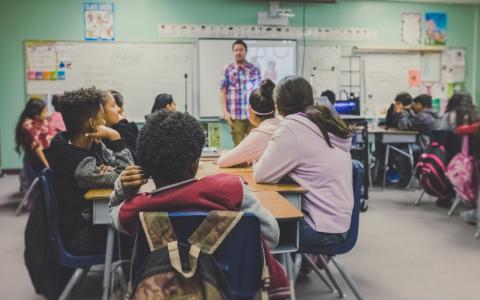
A number of Florida lawyers are offering free or discounted living wills for teachers who may be required to return to the classroom this school year.
"I had read a story a few weeks ago about three Arizona teacherswho'd gone back to school to work on a project," said Charles Gallagher, whose St. Petersburg law firm, Gallagher & Associates, is among those offering teachers free living wills. "All three contracted COVID-19 and one died."
Gallagher said he was "taken aback by the story" and he wasn't the only one, as advocates are now warning about the risks of sending teachers and children back to school prematurely.
Yet the question of when schools should reopen remains a divisive one, particularly in Florida, where the state's largest teachers' union in the state is suing Gov. Ron DeSantis over his administration's push to fully reopen public schools next month, despite the fact that coronavirus cases are skyrocketing in the state.
Gallagher said he saw a picture of a sign that read: "Teacher supplies: books, crayons and wills" at a recent protest, and although its message was morbid, he felt compelled to assist educators — particularly as the Terri Schiavo case polarized his St. Petersburg community and the nation. Schiavo's parents and husband disagreed over what Schiavo, who was left in a "persistent vegetative state" after she suffered cardiac arrest in 1990, would have wanted for her care as there was no living will making the determination for them. After years of publicized legal challenges, Schiavo died following the removal of her feeding tube in 2005.
Since advertising the free living wills, a document that provides legal instructions for a person's choice of medical care should they be unable to communicate them directly to a doctor themselves, he has received inquiries from some 600 teachers and others school employees.
"I heard from one teacher who said she's contemplating just quitting her job to protect herself," Gallagher said. "It's heartbreaking that people have to give up professions they love because of safety concerns."
Lawyers like Gallagher and Jen Englert, the managing partner and founder of The Orlando Law Group, which is partnering with a local radio station to give teachers access to free living wills, have long been advocating for people to get their estate affairs in order.
"We decided to offer these services because teachers were actually coming to us asking for our help," Englert said. "We'd already done discounted wills for first responders and medical professionals throughout the pandemic, but it hadn't occurred to us to do teachers until they came to us. We just wanted to help in the best way we knew how to."
According to Englert, 800 people, most of whom are from the Central Florida area, have reached out in a two-day period.
"I think the coronavirus has made people realize that you can't take it for granted that you'll have a spouse, parent or somebody else be able to communicate your desires for your care, especially since the coronavirus calls for people to be isolated in hospitals," Englert said. "People don't want to think about their death, but the coronavirus highlights the importance of estate planning."
Robert Allen, a criminal justice and family law lawyer based in Pensacola, said he also decided to offer discounts on living wills because he considers "teachers to be first responders."
"They’re going to be the ones that go in risking their health," Allen said, adding that the most important documents teachers should get in order are their Power of Attorney, a document that appoints someone to act on a person's behalf in real estate, business and other finance matters, and an advance healthcare directive, or living will.
Florida Education Commissioner Richard Corcoran, who is also being sued by the Florida Education Association, issued an emergency order this month in which he said all public schools must open at the beginning of the academic school year as reopening schools is not just important for students' academic and social growth, but is also crucial to Florida "hitting its full economic stride."
The Centers for Disease Control and Prevention released guidelinesfor school reopenings Thursday which emphasized students getting back in the classroom. The guidance states that children "appear to be at lower risk for contracting COVID-19, compared to adults," who make up 95 percent of reported cases. According to the CDC, less than 7 percent of reported COVID-19 cases and less than 0.1 percent of COVID-19-related deaths were among children and teens less than 18 years old, as of July 21. And when children do contract the coronavirus, they "generally have a less serious illness," says the CDC.
Like adults, children with underlying medical conditions are at increased risk of severe illness from COVID-19. The CDC has also recorded more than 180 cases of “multisystem inflammatory syndrome in children,” or MIS-C, a rare but potentially deadly condition linked to COVID-19 in children, from March through May. Two percent of the children diagnosed with MIS-C during this period died, per the CDC.
As for the extent to which children under 10 years old spread COVID-19, Dr. Deborah Birx, the White House coronavirus task force coordinator, told NBC's "TODAY" show, it is "still an open question that needs to be studied in the United States."
"We certainly know from other studies that children under 10 do get infected, it's just unclear how rapidly they spread the virus," Birx said.
Although the CDC says schools need to "coordinate, plan, and prepare" to curtail the spread of COVID-19, some believe it would be best for schools — particularly those in Florida, which surpassed 400,000 total coronavirus cases on Friday — to remain closed.
"You have to weigh the opportunity costs. Opening schools means sick and dead children and delaying opening means inconvenience," Gallagher said. "There's just no logic behind the first option."
This article originally appeared on NBC News.



